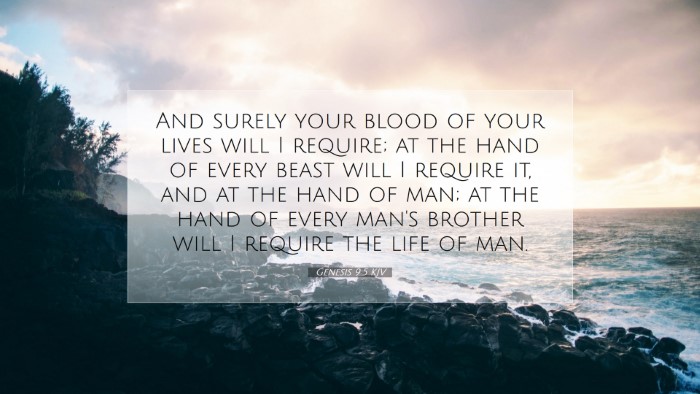Commentary on Genesis 9:5
Verse: "And surely your blood of your lives will I require; at the hand of every beast will I require it, and at the hand of man; at the hand of every man’s brother will I require the life of man."
Introduction
This verse comes at a significant juncture in the biblical narrative—after the flood, when God re-establishes His covenant with Noah and his descendants. The commandments and prohibitions laid out here reflect God’s concern for the sanctity of human life and the order He intends for humanity in a post-flood world.
Theological Significance
1. The Divine Requirement of Blood:
God’s declaration communicates an imperative that the blood of humanity is precious and must not be shed without consequence. As Adam Clarke notes, this verse emphasizes the seriousness of taking life and stands as a divine deterrent against murder. The sanctity of life is a theme that echoes throughout Scripture.
Matthew Henry's Insight: He emphasizes that this requirement illustrates God's justice. The consequence of shedding blood must be met with accountability. Divine providence and governance mandate that the life taken by another will be avenged—either by God Himself or by human authorities that He establishes.
Exegesis of the Text
2. Judicial Provisions:
Albert Barnes points out that this verse sets groundwork for the moral order of society. God provides a legal framework where the punishment for homicide is clearly stipulated as a deterrent. The blood demands retribution, illustrating the principle of justice in God’s creation.
- Retributory Justice: Just as God requires accountability for the life taken, humans are held accountable for their actions. The phrase “at the hand of every beast” reflects the notion that even animals can be held to a certain standard, suggesting that anything that brings about death must be scrutinized.
- Human Responsibility: The requirement for justice underscores a collective human responsibility. Adam Clarke elaborates that his mention of “every man’s brother” evokes the idea that murdering one human being is akin to attacking the entire human race, reflecting our interconnectedness and shared responsibility to uphold life.
Ethical Implications
3. Human Life as Sacred:
Genesis 9:5 sets a clear precedent that human life is sacred and must be protected. The repeated assertion of the preciousness of blood stands as not merely a command but also as a theological and ethical guideline for humanity.
Matthew Henry remarks: The value of human life is established here as rooted in the image of God. Humans are created in His likeness, and our lives carry inherent dignity which demands respect and protection. The mandate of justice that God provides, therefore, is as much about maintaining order in society as it is about honoring God's creation.
Covenantal Context
4. God’s Covenant with Humanity:
This verse is part of the greater patriarchal covenant with Noah. Following the flood, God re-establishes harmony and order by instituting certain moral laws. This shows God's desire for society to operate under His divine governance.
- The Nature of the Covenant: Adam Clarke emphasizes that the instructions given to Noah are not merely recommendations but binding commitments. The covenant establishes a framework to govern human relations and their interaction with the created order.
- Consequences for Violation: The severe consequence of bloodshed reflects God’s deterrent against moral chaos, which might arise if humanity were to disregard the sanctity of life. This is foundational for understanding justice in God’s kingdom.
Reflection and Application
5. Contemporary Relevance:
For modern-day pastors, students, and theologians, Genesis 9:5 serves as an urgent reminder of the current issues surrounding the value of life. As debates around social justice, abortion, and capital punishment intensify, this scripture emphasizes the divine necessity to uphold life.
Application for Pastoral Ministry:
Leaders in faith communities are called to advocate for the sanctity of life, drawing from the principles embedded in this verse. The pastoral message must integrate a call for justice and the protection of the vulnerable, reiterating God's intent from Genesis for a harmonious society.
Conclusion
Genesis 9:5 is a critical declaration of the sacredness of life and the serious nature of justice from a biblical perspective. The insights from Matthew Henry, Albert Barnes, and Adam Clarke compel us toward a deeper respect for life and the frameworks of justice that God provides. As we navigate our own lives and societal structures, let this verse guide us in honoring and protecting the precious gift of life given by our Creator.


